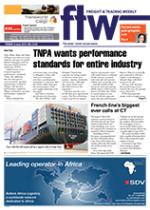Tops, Mops, Rops and Hops
will gain you entry to a port
industry nirvana. So sayeth
Herbert Msagala, COO of
Transnet National Ports
Authority (TNPA).
Added to last year’s
terminal operator
performance standards
(Tops), the authority
has now also got its
eyes on marine operator
performance standards
(Mops), rail operator
performance standards
(Rops) and haulier operator
performance standards
(Hops).
What’s behind this
acronymic plan, according
to Msagala, is that with
Tops port terminals
now have a performance
standard to work from. But
the whole rather than just
the terminal part of the
port supply chain has to be
managed.
And there is distinct
justification for this plan.
“We (the TNPA),” said
Msagala, “found that
capacity was being wasted
in all areas of the port
system – marine, terminals,
rail and road – although
the extent of the waste
did differ between the
segments.”
And that sets the scene
for the first port operational
centre. The Port of Durban
is due to go live in August.
And its operational centre
will control and co-ordinate
all the marine, terminal,
and road and rail systems
within and around the port.
And the benefit of the
electronic data interchange
(EDI) nature of the beast is
that it will allow the TNPA
to record delays in real
time. It will also generate
same-day port performance
figures. When it eventually
goes national it will also
enable rescheduling of
delayed ships with their
next port of call.
All very well, but does
this monitoring system
work in the eyes of a private
sector observer?
FTW discussed this
matter with a freight group
senior executive. And, when
we posed that question,
he suggested that if you
wanted to be cynical you
would suggest that instinct
and experience led you to
believe it would be no more
than a paper-producing
wonder. That no practical
or operational advantages
would transpire from the
number-crunching.
“That’s the danger,” he
told FTW.
“But I believe that it’s a
genuine and positive effort
on the part of Transnet.”
The principle behind
the system, according
to our contact, is that –
when an inefficiency has
been identified – “that
should automatically
lead to role-players and
port management getting
together to ask: ‘Why, and
what must be done about
it?’ This should then result
in an adjustment being
made and to become more
productive.”
There has to be a
relationship between
the port users and port
management if the system
is to produce its full
potential, our observer
insisted.
“The system will give you
the data. And that’s very
important.
“What is to be hoped is
that the data is analysed,
and the guys say: ‘Let’s sit
down and try to get it better
by asking and answering
all the lateral questions
surrounding the issue’.
“That’s what we need.
Meetings between all
the stakeholders to ‘get it
better’.”
TNPA wants performance standards for entire industry
06 Jun 2014 - by Alan Peat
0 Comments
FTW - 6 Jun 14

06 Jun 2014
06 Jun 2014
06 Jun 2014
06 Jun 2014
Border Beat
16 Apr 2025
